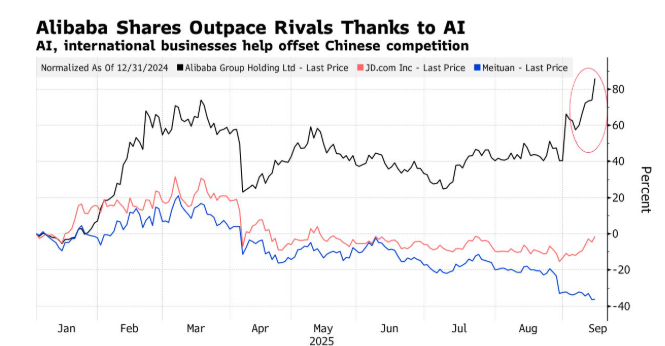Alibaba Group Holding Ltd. has taken a series of measures aimed at consolidating its position in the AI development boom in China, and its share price has risen by the largest margin in about two weeks.
The shares of this e-commerce giant rose by more than 7% in early trading in Hong Kong, following the gains on the US stock market overnight. This has pushed the company’s share price up by over 80% this year, thanks to its aggressive move into the emerging field of artificial intelligence.
Alibaba issued $3.2 billion in convertible bonds this week to support China’s largest budget for artificial intelligence infrastructure and cloud services. The company released an updated version of its flagship Qwen series, aiming to compete with DeepSeek and OpenAI. According to The Information, Alibaba and Baidu have begun using self-developed chips in artificial intelligence training to replace expensive Nvidia accelerators. Baidu’s share price rose nearly 13% in Hong Kong, reaching its highest level since October 2024.
After years of being battered by regulatory scrutiny in the internet business, Alibaba is making a strong comeback. The company co-founded by Jack Ma has become one of the leaders in the national artificial intelligence (AI) craze this year. Since then, Alibaba has announced its full commitment to general AI – the ultimate goal of many technology companies.
The company’s recent move comes at a time when optimism about the prospects of artificial intelligence (AI) is on the rise, with the technology expected to revolutionize industries and the economy. This week, Oracle released a strong outlook for global AI spending, fueling a rebound in the sector.
Alibaba’s recent moves have completely shifted investors’ attention to its artificial intelligence potential, offsetting concerns over its price war in the food delivery sector, said Paul Pong, managing director of Pegasus Fund Management. “With its ability to produce its own chips, it should be able to generate more growth momentum.”

Despite competing against well-funded rivals on another front, Alibaba’s share price still rose.
This week, the company announced that it will invest more funds in incentives and subsidies to support its local services and e-commerce business. The company has promised to invest an additional 1 billion yuan (140 million US dollars) in incentives to increase the traffic of one of its most popular online services. This move will increase the pressure on JD.com and Meituan in the competition for Chinese consumers.
Some analysts believe that, given the company’s intense competition for users to drive its core business, this is undoubtedly good news. However, others point out that, with the profit potential of artificial intelligence still unclear, profit margins may be eroded.
Alibaba’s newly released AI models, including the more efficient Qwen3-Next and the Qwen-3-Max-Preview with 1 trillion parameters, should be able to support the demands of its cloud services. However, given the low profit margins and high capital costs, the returns of this department are expected to remain weak. In the 12 months ending June 2025, the adjusted EBITA of the Cloud Intelligence division increased by only $86 million on a quarterly basis. We believe that Tencent is still in a more favorable position for AI investment returns in the short term.


